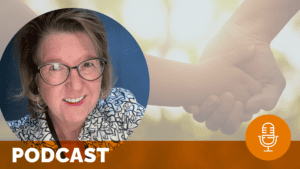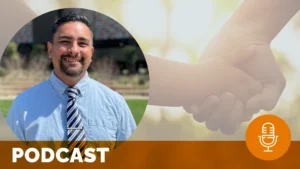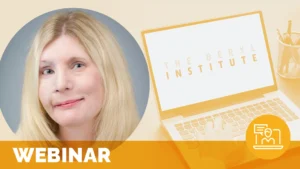Walking the Walk: Essential criteria for organisations when recruiting consumers as employees

By Liz Newton
Identified lived experience roles are increasingly being established by health organisations outside of the traditional mental health service and peer worker context. These are often quality improvement, innovation, or research organisations with a health focus, and the lived experience role is tasked with being a “voice of systemic advocacy” while also building staff capability in consumer engagement.
The aspiration is that their lived and learned wisdom will rub off on the organisation and add authenticity and insight to engagement practice. In turn, it may increase the likelihood of consumer engagement occurring in a way that is based on principles of purpose, meaning, psychological safety, trauma-awareness, inclusivity, and equity. A recent study shows how engagement capability was built in a health innovation organisation in NSW Australia through a consumer-led learning community. The insights from the facilitator and their authenticity and openness to sharing their lived experience was identified as one of the community’s main strengths.
Do lived experience roles experience the same engagement-capable practice from their organisation as they have been employed to promote?
The evidence suggests they do not, and there are several barriers for the lived experience workforce, including but not limited to lack of role clarity, lack of organisational understanding and commitment, lack of management understanding, inadequate resources, and training opportunities.1 How can some of these issues be overcome?
Before even going to recruitment, the health organisation needs to be specific about the “why” of the lived experience role. What is the purpose of the role? What is its goal? Answers to these questions can then inform a clear position description and the mapping of tasks. It creates clear expectations and supports agency and safety. If purpose can’t be defined, then the question needs to asked: Why is the role being created?
Professional mentorship should be in place from the outset, ideally with someone also in a lived experience role, who understands the unique challenges that come with sharing personal experience as a function of their employment. Providing access to peer supervision demonstrates an understanding that there is a vulnerability involved in harnessing personal experiences to highlight the case for health system improvement, a vulnerability arguably not required of other positions.
Once appointed, clear discussion needs to be had around any supplementary support required (e.g., flexible hours, regular debriefs, safe boundary setting, etc). Lived experience is rarely confined to the past, and re-emergence of health issues is commonplace. A “wellbeing plan” could articulate what extra support looks like and when it would need to be actioned. The goal is two-fold: 1) To give the person agency in a way that does not stigmatise or polarise them from other roles within the organisation, and 2) to foster manager understanding of, and investment in, lived experience roles.
Recognition and acknowledgement should be given for the contributions made by consumer roles, the same way it is afforded to other types of expertise. These roles require skilled leaders who recognise that lived expertise in the health improvement context is a commodity that equals clinical expertise.
Crucially, and perhaps in caution, organisations need to examine their readiness. It is common for organisations to state that the identified role “keeps them honest” implying the individual will somehow hold the organisation to account around consumer-centred improvement (improbable for one person so low in the power hierarchy). Yet, in action, this requires an organisational willingness to self-reflect, relinquish some power, be responsive, and take on hard-to-hear feedback. It requires leaders with vision, heart, and the guts to change Research suggests that power differentials remain, co-opting of lived experience occurs, and organisational culture and acceptance remains embryonic.2
The systemic advocacy stipulated in the position description is often interpreted as pushback – a difficult and disgruntled employee who is complaining and making demands. Navigating this requires a skilled manager who can step up and advocate in collaboration with the consumer role. Without thoughtful leadership, the risk is that rather than separating the problems that are highlighted by the person, the person is seen as the problem. Left unexplored, this attitude can lead to a complete breakdown in relationship, disengagement, and often abandonment of the role and the person in it.
So, to conclude, organisations that recruit consumer roles (and indeed any identified roles) are demonstrably progressive in recognising how these roles can challenge convention and bring lived expertise, but putting them on the payroll is not enough. Recruitment of lived experience roles must be accompanied by clear purpose, mature and insightful leadership, and a more expansive approach to workplace well-being and support that is not fragilising or reductive.
The “success” of these roles – both in their impact and the experience they have of their own employer lies in how leadership roles approach this relationship. Recruitment of lived experience roles is itself a method of engaging consumers. It is not enough to employ someone to increase organisational engagement capability; the organisation must demonstrate its own engagement capability in the way it leads, supports, and manages identified roles. It must exemplify best practice engagement principles, because anything less is erring dangerously toward virtue signalling and tokenism.
About the Author
Liz has lived experience of mental illness (complex trauma) and suicidality and is a survivor of domestic and family violence. This experience spans across her lifetime and is what led her to focus her energies on the field of consumer partnership and engagement. She is a storyteller and uses human experience to bridge the clinical and operational world of healthcare to the personal, individual world experience. As a Patient Partner with the NSW Agency for Clinical Innovation, her role is to build capability within the organization and partner with consumers in healthcare design and delivery.
References
- Newton, Liz., Dimopoulos-Bick, Tara. (2023). Case study on the Partner Ring: early feasibility indications of a novel innovation to increase consumer partnership across a health innovation organisation in NSW Australia. Unpublished and under peer-review
- Byrne, Louise & Stratford, Anthony & Davidson, Larry. (2018). The Global Need for Lived Experience Leadership. Psychiatric Rehabilitation Journal. 41. 76-79. 10.1037/prj0000289.
- Byrne, L., Roennfeldt, H., Wang, Y. and O’Shea, P. (2019), ‘You don’t know what you don’t know’: The essential role of management exposure, understanding and commitment in peer workforce development. Int J Mental Health Nurs, 28: 572-581. https://doi.org/10.1111/inm.12562
Related content
-
 Environment & Hospitality
Environment & HospitalityWords Matter: Transforming Care Through Better Communication
In this episode of To Care Is Human, Terri Ipsen talks with Susan Osborne about the power of words in healthcare. Based on her PX blog, “What to say instead of…,” Susan shares practical tips and real examples of how small language changes can ease anxiety, build trust, and improve patient experience. Learn how intentional
Learn more -
 Environment & Hospitality
Environment & HospitalityYou Can’t Go Wrong If You Do Right by the Patient
Julian Manriquez, Supervisor for Hospitality Services at City of Hope, discusses how his 110-acre campus strives to provide visitors with a five-star transportation and wayfinding experience through a unique Ambassador program. Listen in as he describes the critical roles of innovation and evolution throughout the program’s beginnings, survival during the COVID-19 pandemic, current operations, and
Learn more -
 Environment & Hospitality | Quality & Clinical Excellence
Environment & Hospitality | Quality & Clinical ExcellenceThe Impact of Adverse Childhood Experiences in Pediatric and Adult Healthcare
Being a pediatric patient in healthcare can be filled with misconceptions, anxiety, and distress. The adverse childhood experiences that may occur not only impact the pediatric healthcare experience but coping with healthcare experiences well into adulthood. This webinar will discuss adverse childhood experience implications on pediatric and adult coping, long term care, and overall patient
Learn more
